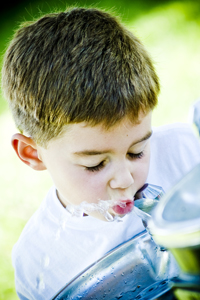Beat the Heat: Know the Signs of Heat-Related Illness

When you begin to feel the symptoms of heat exhaustion, rest in a cool place and drink plenty of water.
Summer is here and the West Texas weather can be hot. Franklyn Babb, M.D., Texas Tech Physicians Family Medicine, said what you may not know is that extremely hot weather can be harmful if not fatal.
What is heat-related illness, what causes it, what do you do if you have the symptoms and how you can prevent harm to yourself?
“Heat exhaustion and heat stroke are forms of heat-related illness. Heat exhaustion is the term applied to milder forms of this illness,” Babb said. “It is caused by exposure to high temperatures. The temperature outside can be as low as 91 degrees Fahrenheit if the humidity is high or 104 degrees Fahrenheit for our average level of humidity in West Texas.”
These temperatures could cause your body to retain too much heat and cause heat exhaustion with symptoms that include:
- Heavy sweating
- Feeling weak/confused
- Dizziness
- Nausea/vomiting
- Headache
- Fast heartbeat
- Dark-colored urine
- Diarrhea
Babb said these symptoms seem bad enough for most people to pay attention. However, young athletes in competitive sports often try to ignore these warning signs. This could quickly progress to worsening of symptoms and heat stroke.
“Athletes, young or adult, can acclimate to hot weather activities if given several days to slowly build their tolerance," Babb said. "They should always maintain good water consumption. Older patients and the very young are susceptible as well and can develop these symptoms over the course of hours to days in spite of not being involved in sports. Ignoring the symptoms above places people at risk to develop heat stroke. To keep that from happening rest in a cool place and drink plenty of water. Do not resume activity in the heat until the symptoms pass and be careful to watch for reappearance of symptoms.”
Heat stroke is a dangerous condition that can lead to death. If someone you know is experiencing the following symptoms call 911 and get them to someplace cool. While you are waiting for EMS, unclothe them as much as is possible and actively cool them off with cool/cold water, fans, or immersion up to the neck. These are the warning signs:
- Skin that feels hot but not sweaty
- Confusion/hallucinations or loss of consciousness
- Frequent vomiting
- Difficulty breathing
- Severe headache
- Temperature above 104 degrees Fahrenheit
People sometimes engage in partying during hot weather and that can make the situation more dangerous. Combine severe heat with alcohol, cocaine, methamphetamine or tranquilizers, and you put yourself at more risk.
“The reason is these drugs negatively alter the body’s ability to dissipate heat and predispose those who consume them to dehydration,” Babb said. “Prescription medications can also elevate your risk, especially blood pressure medications and antihistamines. You should be careful with exposure to heat if taking prescription medications. Fortunately, you can reduce your risk to heat-related illness by following some simple guidelines.”
To protect yourself and those you love from heat exhaustion or heat stroke, do the following:
- Stay out of the heat by scheduling outdoor activities in the early morning
- Wear loose fitting, light colored clothing
- Find or create shade
- Drink plenty of water and avoid caffeinated or alcoholic beverages
- Take frequent breaks from strenuous activity in the heat
Enjoy outdoor activities and your summer by using common sense approaches like these. Stay cool.
Related Stories
Celebrating Veterans: TTUHSC’s General Martin Clay’s Legacy of Service and Leadership
From his initial enlistment in the Army National Guard 36 years ago to his leadership in military and civilian health care management roles, Major General Martin Clay’s career has been shaped by adaptability, mission focus and service to others.
Texas Tech University Health Sciences Center School of Nursing Named Best Accelerated Bachelor of Science in Nursing Program in Texas
The TTUHSC School of Nursing Accelerated Bachelor of Science in Nursing (BSN) program has been ranked the No. 1 accelerated nursing program in Texas by RegisteredNursing.org.
TTUHSC Names New Regional Dean for the School of Nursing
Louise Rice, DNP, RN, has been named regional dean of the TTUHSC School of Nursing on the Amarillo campus.
Recent Stories
National Academy of Inventors Names TTUHSC Faculty Senior Members
The National Academy of Inventors (NAI) has designated two current and one former TTUHSC faculty researchers as Senior Members.
The John Wayne Cancer Foundation Surgical Oncology Fellowship Program at Texas Tech University Health Sciences Center Announced
TTUHSC is collaborating with the John Wayne Cancer Foundation and has established the Big Cure Endowment, which supports the university’s efforts to reduce cancer incidence and increase survivability of people in rural and underserved areas.
TTUHSC Receives $1 Million Gift from Amarillo National Bank to Expand and Enhance Pediatric Care in the Panhandle
TTUHSC School of Medicine leaders accepted a $1 million philanthropic gift from Amarillo National Bank on Tuesday (Feb. 10), marking a transformational investment in pediatric care for the Texas Panhandle.
